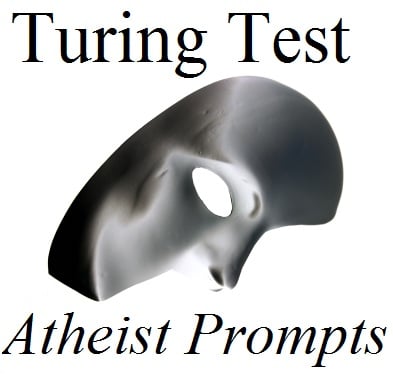This is the tenth entry in the Atheist round of the 2013 Ideological Turing Test. This year, atheists and Christians responded to questions about sex, death, and literature.
Polyamory
The actual question on civil marriage is if it should exist at all.
Regardless of the answers we come up with, the need to debate which romantic and sexual arrangements should get the government stamp of approval is already a bad sign. Practically speaking, spousal benefits would be way less relevant if we had a better social safety net. Most other effects of marriage could be done through private contracts. Then different social groups would still have different opinions on what counts as a “real” marriage, but at least the conflicts would be defused by disentangling them from power questions.
Of course realistically there won’t be political majorities for this in the foreseeable future. Even if there were, long transitional periods would be necessary. Suddenly abolishing the benefits of marriage without larger social change would clearly hurt the people who have built their life around the existing institution. (For comparison, introducing gay marriage doesn’t affect straight marriages at all.)
So talking of second-best short term realistic institutions, I think limiting people to one civil marriage is a reasonable utilitarian trade-off. This question is somewhat different from gay marriage on both sides of that trade-off: Disallowing gay marriage is a judgment about all romantic or sexual relationships a given person could potentially have, which is in effect a judgment on the person. Legally recognizing only some of a person’s relationships also can bad for the people involved, but still is different from condemning the partners themselves. On the other side, polygamy would depend on some rule-changes for marriage and the rest of society has a legitimate interest in those rules. For example, an employer’s wish not to pay spousal benefits more than once is much more respectable than a wish not to pay them to someone who has sex with the wrong kind of people. Also, leaving medical decisions to a group of people who can disagree sounds like a really bad idea. One could try to alleviate those problems by having primary and secondary marriages. But given that people already can have partners outside of civil marriage, that wouldn’t be really different from not recognizing secondary marriages at all. The distinction wouldn’t be a complete solution anyway, because some polyamourous relationships simply don’t map to that model.
So all in all civil monogamy isn’t perfect, but good enough.
Let me be perfectly clear however, that there is nothing morally wrong with consensual polyamory. In fact seeming like a moral judgment is one of the major downsides of civil monogamy.
As for sacramental marriage, that should be for religious people to figure out in their respective churches. The laws prohibiting religious polygamy are historical relics and should be repealed. This is actually about the last part of the definition of marriage religious communities aren’t free to sort out for themselves. They already can allow or disallow remarriage after divorce, allow or disallow gay (or even interracial) marriage, polyamorously marry dead people, or pretend their divorced marriages never really happened. I don’t see why polyamory among the living would be any different.
Euthanasia
There are very hard moral questions, but this isn’t one of them.
Euthanasia is morally legitimate if the patient actually wants it for good reasons (or did want it before losing agency), and those good reasons definitely won’t go away. So a depressive phase doesn’t qualify, but, to take the stereotypical example, not wanting to spend the remaining time to death in terrible pain does.
One way to figure this out is looking at who benefits from the prohibition of Euthanasia. It’s clearly not the patients, because all they get out of it is more unwelcome suffering. Society in general doesn’t benefit from their suffering either. So it looks like people like such a rule itself rather than its results. The general taboo against killing actually is central to civilization, so we are naturally squeamish about relativizing it. Simple bright-line rules generally seem more comfortable than fuzzy complex ones.
The question then is if a vague good feeling about never making any exceptions justifies the very tangible suffering it inflicts on other people. Asking that question already answers it.
Euthanasia is never obligatory.
It isn’t obligatory to patients, because letting them retain their agency is the whole point. Some people argue heirs or health-care providers would exercise social pressure to accept Euthanasia, but that just-so story is hard to reconcile with the fact that those are the exact groups now exercising lots of pressure to accept futile care.
I see no need to make it obligatory for health care providers either. There’s much more room for conscience protections here than with abortion or contraception, because Euthanasia isn’t time-critical. Where Euthanasia is legal, figuring out if it is appropriate in a specific case takes extensive patient-doctor consultations anyway. Making someone engage in such consultations with a doctor who opposes Euthanasia in general would only add to the needless suffering.
Bonus
I guess the spirit of the question is talking about fiction, so “scientific paper” probably doesn’t count.
That makes the question fairly hard, because a large part of my worldview is actually knowing what we don’t know.
Complex multi-step arguments tend to have mistakes. Even if we are, say, 90% sure of every step of an argument, 7 steps in the argument is more likely wrong than right. And sure enough, experience confirms complex a-priori theories rarely survive contact with actual data. So it’s actually rational to stay close to tight feedback loops and admit we don’t know much about questions we don’t have reliable reality-checks on.
One candidate for a genre expressing that would be parody. The downside is that a parody can only ever refute a particular theory, which probably comes across as expressing another one.
Science-fiction might be another candidate. Of course no specific science-fiction scenario should be taken seriously, but collectively the genre can express the size of the of the possibility space.
But ultimately, I think preaching through fiction is a bad idea.
This doesn’t mean fiction shouldn’t be deep though. For example, the explicit form of the worldview information transported through Shakespeare’s Othello is rather trivial. Jealousy, paranoia bad, gruesome deception evil. But that kind of system 2 analysis misses the point. The play communicates that message to system 1, which struggles much harder with understanding this.
You can vote on whether you think these answers were written by a Christian or an Atheist here. Comments are open to discuss the substance of the post and for speculation about the true beliefs of the author, so please vote before looking at the comments.












